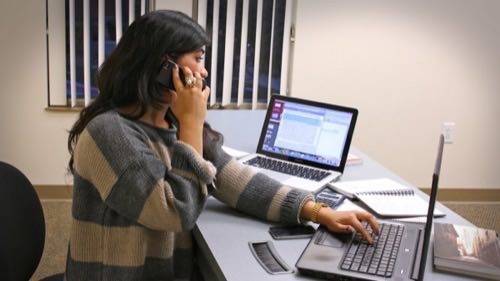
A report published this week by Michigan State University’s psychology department found evidence that using multiple forms of media at the same time is linked to symptoms of anxiety and depression. The study was conducted with data from two surveys of 319 undergraduate students, a group that engages in a lot of media multi-tasking.
One study measured symptoms of depression and anxiety, the other how the subjects engage in media multitasking, (i.e. video games, texting, apps) to give researchers an idea of whether a subject was a high, low or medium media multi-tasker. It’s important to note that the surveys measured indicators of depression and anxiety, but didn’t serve as a clinical diagnosis.
Participants with high levels of media multitasking were put into one group, those with lower levels in another. The latter group had a median score of 3.66 out 9 on a scale of depressive symptoms. The higher level group? 6.19 out of 9. The study also found that those in the higher range scored a higher median number for indicators of social phobia symptoms.
While this is the first study of its kind to research the topic of multiple media usage and mental illness, it’s not the first that has found a link between internet use and depression. In fact, earlier this year, Sriran Chellappan, assistant professor of computer science at Missouri University of Science and Technology and Raghavendra Kotikalapud, a software development engineer, penned a story for the New York Times about how depressed people use the Internet. Their method of data collection was similar to the Michigan State Study, as were their results. They found that the students with higher levels of depressive symptoms used peer-to-peer sharing (movies, music) more than those without. They also checked their email more often, which led the reseachers to believe this correlated with high levels of anxiety.
Cause And Effect?
There are plenty of questions left to be answered, and plenty of room for future research. Mark Becker, lead investigator on the study, said in the report that the researchers aren’t sure whether media-multitasking is causing depression and anxiety or if people already experiencing mental illness are using media as a form of distraction from their condition.

If media turns out to be the problem, Becker said that potential recommendations could include taking a “media vacation” to see if anything changes. While the direction of causality still needs to be determined, the bottom line is that multi-media consumption does seem to be linked with signs of anxiety and depression. “This could have important implications for understanding how to minimize the negative impacts of increased media multitasking,” said Becker in the report.
As for future research, in an email to ReadWrite, Becker wrote that the biggest challenge is to figure out which is the cause and which is the effect. Controlling a subject’s day-to-day media multitasking habits and randomly manipulating it isn’t easy, he added. “However, we hope to determine whether doing a task that requires multitasking with media produces a momentary shift in people’s mood and/or anxiety. If so, it would provide some indication that media use can play a causal role.”
Mark Becker p
hoto by G.L. Kohuth.
















